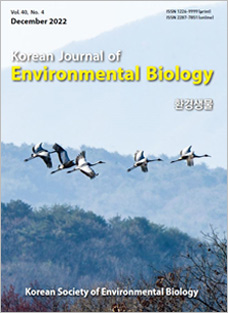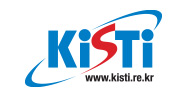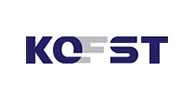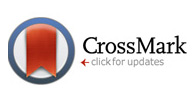Instruction for Authors
1. Types of Manuscripts
Korean Journal of Environmental Biology (KJEB) publishes three types of manuscripts. There are no strict
limitations on the word count or the number of figures and tables for any type of manuscript. However, the
editorial board and reviewers may request adjustments to the length of manuscripts at their discretion.
1) Original article: A paper of original research containing independently valuable conclusions or facts.
2) Review paper: An in-depth paper dealing with the latest research trends or criticism of existing knowledge through a thorough literature review on topics related to environmental biology. Review papers must be approved for submission by consulting with the editor-in-chief in advance.
3) Note: A paper containing content that cannot be published as an original article, such as the discovery of limited parts or new experimental methods but is worth presenting as new research results. Notes should be written in the same format as an original article but written briefly, focusing on critical content.
2. Guidelines for Research Involving Living Organisms
Research involving living organisms must adhere to research ethics for consideration of publication in KJEB.
1) Research involving animals
a) Research ethics: Researchers must respect animals as sentient creatures and provide appropriate care. Researchers should strive to select research topics and methods that do not disrespect animals.
b) Researchers must consider the following principles (3R principles): (1) Replacement of animals by alternatives wherever possible, (2) reduction in the number of animals used, and (3) refinement of experimental conditions and procedures to minimize harm to animals.
c) If authors have conducted research involving animals, they should include a section (ethics statement) in their manuscript explaining how they ensured the ethical principles. The description must include at least the following: (1) the name of the ethics committee, (2) the approval identification code, (3) the date of approval, and (4) national legislation.
d) Other details must follow international standard guidelines. KJEB recommends that authors refer to the
guidelines provided by Animal Research: Reporting of in Vivo Experiments (ARRIVE; https://arriveguidelines.org/) and the Association for the Study of Animal Behaviour (ASAB; https://www.asab.org/).
2) Research involving plants
a) Experimental studies using plants (cultivated or wild), including the collection of plant material, must comply with institutional, national, and international guidelines.
b) Voucher specimens must be deposited in a public herbarium or other public collection providing access to the deposited material, and relevant information must be clearly stated in the manuscript.
c) Authors must indicate details, such as the exact location (GPS coordinates) where the plants were collected, the date of the collection, and the number of plants collected in the manuscript. The person who identified the plant must also be indicated.
3) Common obligations for research involving organisms
a) Habitat: Researchers are responsible for reducing the negative impact of their research practices on habitats. Researchers should strive to minimize the effects of direct investigations on organisms, sampling, and instrumental measurements on the environmental habitat of organisms.
b) Biodiversity: Researchers are responsible for ensuring that research using organisms does not threaten biodiversity. Therefore, researchers should consider in advance the negative impact that research using specific organisms may have on the ecosystem. In particular, more careful consideration and review are required when conducting research involving endangered species. KJEB strongly recommends that researchers check the Red List Index (https://www.iucnredlist.org/search) provided by the International Union for Conservation of Nature (IUCN) before planning research involving organisms. Researchers also need to refer to information on species that require protection and conservation, as designated by each country.
c) Obligations for data disclosure and sharing: Researchers are responsible for transparently disclosing and facilitating the sharing of research results involving organisms. This is to reduce the use of organisms in the research process by avoiding the unnecessary repetition of experiments. Therefore, researchers should strive to minimize the use of organisms by disclosing the results of their studies in detail and precisely providing supplementary raw data as necessary.
d) Attention to regulations and laws: Researchers must comply with national laws, regulations, and international agreements regarding the use of living organisms. These are subject to constant revision, so researchers should make an effort to check and familiarize themselves with the current versions.
3. Research and Publication Ethics
Authors must adhere to the following research ethics and ensure that relevant details are stated in the manuscript. For the research and publication ethics that are not stated in these guidelines, the International Guidelines on Good Publication Practice (https://publicationethics.org/guidance/Guidelines) can be applied.
1) CRediT authorship contribution statement
For transparency, each author's role in the manuscript should be explained (after the Korean abstract). The
section titled “CRediT Author Contribution Statement” should be filled out in the following order: author
name, then CRediT role(s). CRediT roles represent the author’s role in the following terms: Conceptualization, Data curation, Formal analysis, Funding acquisition, Investigation, Methodology, Project administration, Resources, Software, Supervision, Validation, Visualization, Writing-Original draft, and Writing-Review & editing. For more detailed information, please refer to the following web page: https://www.elsevier.com/authors/policies-and-guidelines/credit-author-statement
2) Declaration of competing interests
Authors must disclose any financial and personal relationships with others or organizations that could inappropriately influence their research.
Examples of potential conflicts of interest include employment, consultancies, stock ownership, honoraria, paid expert testimony, patent applications/registrations, and grants or other funding.
The competing interests of all authors must be disclosed in detail, and instances of no competing interests must be clearly declared.
Disclosures and declarations of competing interests must be made in the “Declaration of Competing Interest” section following the “CRediT authorship contribution statement” section in the manuscript.
3) Multiple, redundant, or concurrent publications
Only manuscripts that have not been previously published elsewhere and are not currently under review for publication can be submitted.
The submission of a manuscript on the same study in which only the language has been changed is strictly prohibited. However, redundant publications do not include poster/oral presentations at conferences, dissertations, and published lectures. Papers subject to multiple, redundant, or concurrent publications will be withdrawn immediately, and the authors of the papers will receive additional disciplinary action at the judgment of the Research Ethics Committee of the Korean Society of Environmental Biology (KOSEB).
4) Appropriate use of the terms gender and sex
Authors should use the terms sex (biological factor) and gender (identity, psychosocial or cultural factors) correctly within their manuscripts. Except in inappropriate cases, the sex or gender of the person, the sex of the animal, and how the sex and gender were determined must be clearly stated. If a study was conducted with a sex- or gender-biased group, authors should clearly explain the reason. The authors should explain how the race or ethnicity of subjects was determined and clarify its propriety. For more detailed information, please refer to the following guidelines: https://doi.org/10.1186/s41073-016-0007-6
5) Rightful authorship
A person who meets all of the following criteria is considered an author, and a person who meets fewer than four of the criteria is considered a contributor:
a) Substantial contributions to the conception or design of the work; or the acquisition, analysis, or interpretation of data for the work; AND
b) Drafting the work or revising it critically for important intellectual content; AND
c) Final approval of the version to be published; AND
d) Agreement to be accountable for all aspects of the work in ensuring that questions related to the accuracy or integrity of any part of the work are appropriately investigated and resolved.
6) Transparent author information
a) Authors must indicate the affiliations and positions of all authors in the online submission system.
b) The editorial board will reject the submitted manuscript if the author’s affiliation and position are unclear.
c) If minors are included as authors, the authors must inform the editorial board before submitting the manuscript, and the editorial board will judge the appropriateness of authorship.
d) If minors are included as the authors of a manuscript that has been confirmed for publication, it shall be published by specifying that there are minor authors on the first page of the manuscript.
e) Changes in authorship by adding or deleting authors, and/or changes in corresponding authors, and/or changes in the order of the authors are not accepted after acceptance of the manuscript. Only in exceptional cases can authors request the review and approval of the editor-in-chief by e-mailing specific reasons for an authorship change. However, no request for authorship change is allowed after the manuscript has been published and posted online.
7) Copyright
All copyrights of published manuscripts belong to the KOSEB, while the author holds all responsibility for the information (materials and methods, results, etc.) covered in the manuscript. Permission of the KOSEB editorial board is required for resale or distribution outside the KJEB and for all other derivative works, including compilations and translations.
Vol. 40 No. 4 (2022.12)

Frequency quarterly
Doi Prefix 10.11626/KJEB.
Year of Launching 1983
Publisher Korean Society of Environmental Biology




Online Submission
submission.koseb.org
KOSEB
Korean Society of Environmental Biology
Contact info
Any inquiries concerning Journal (all manuscripts,
reviews, and notes) should be addressed to the managing
editor of the Korean Society of Environmental Biology.
Yongeun Kim,
Korea University, Seoul 02841, Korea.
E-mail: kjeb@koseb.org
Tel: +82-2-3290-3496 / +82-10-9516-1611






